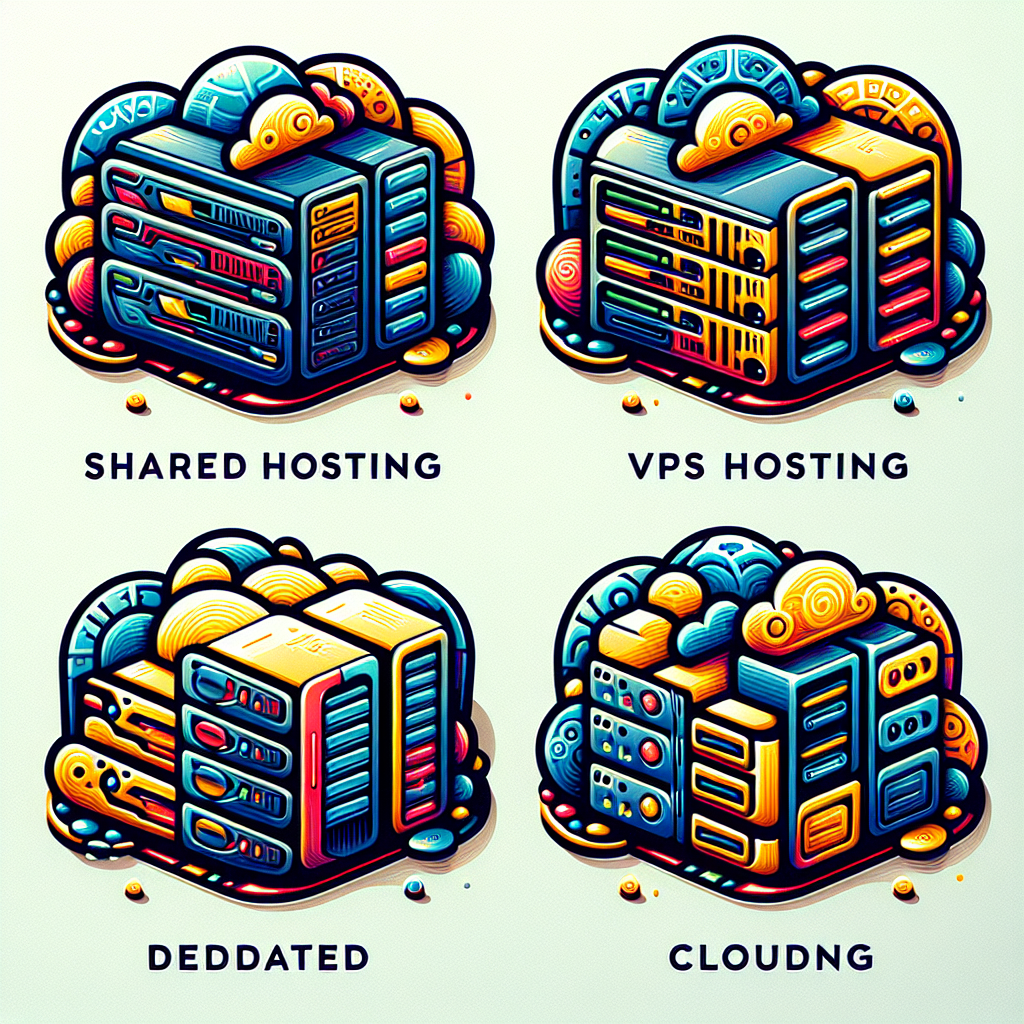When you’re venturing into the world of online business, one of the first and most important steps is understanding how expensive is hosting a website. Website hosting costs can vary dramatically based on several factors, including the type of hosting service you choose, the features you need, and the level of customer support offered. Grasping these elements is crucial for budgeting and planning your online business effectively.
Primarily, website hosting can be categorized into shared hosting, VPS hosting, dedicated hosting, and cloud hosting. Each of these has its own set of advantages, limitations, and price points. For instance, shared hosting is typically the most affordable option but comes with limited resources and performance capabilities. On the other hand, dedicated hosting offers top-tier performance but is significantly more expensive.
Additionally, there are other costs to consider beyond the hosting plan itself. Domain registration, SSL certificates, and website maintenance can all add to your overall expenses. These elements can make or break the effectiveness of your website, impacting your ability to attract and retain customers.
Understanding these costs early on will help you make informed decisions and avoid potential pitfalls down the road. Visit this site today to start your own online business. All this information is free, and we don’t sell anything on this site. Subscribe to my email list and get updates on building effective sales funnels that generate leads & sales in your business.
Types of Web Hosting Services

When considering how expensive is hosting a website, it’s essential to understand the different types of web hosting services available. Each type caters to varying needs, offering distinct levels of performance, security, and cost. Here’s a closer look at the main types:
- Shared Hosting: This is the most cost-effective option, ideal for beginners or small websites. Multiple websites share the same server resources, which keeps costs low but can impact performance if one site experiences high traffic.
- VPS Hosting: Virtual Private Server (VPS) hosting provides a dedicated portion of a server’s resources. It offers more control and better performance than shared hosting. VPS is suitable for growing websites that need more power and customization options without the high cost of a dedicated server.
- Dedicated Hosting: With dedicated hosting, you rent an entire server exclusively for your website. This option provides the highest level of performance, security, and customization. However, it comes at a premium price, making it a better fit for large businesses or high-traffic websites.
- Cloud Hosting: This type of hosting uses multiple servers to balance the load and maximize uptime. Cloud hosting is scalable and flexible, allowing you to adjust resources based on your needs. It’s generally more expensive than shared and VPS hosting but offers excellent reliability and performance.
Choosing the right type of hosting depends on your website’s requirements and your budget. Each option carries its own set of benefits and drawbacks, which should be carefully weighed when making your decision.
Factors Influencing Hosting Costs

Understanding how expensive is hosting a website involves more than just looking at the basic hosting fees. Several factors influence the overall cost of hosting, each contributing to the total expense in different ways. Here are some critical factors to consider:
- Bandwidth and Storage: The amount of data your website transfers and the storage space it requires can significantly impact hosting costs. Websites with high traffic or rich media content will need more bandwidth and storage, leading to higher fees.
- Performance and Uptime: Hosting services that guarantee high performance and uptime often come at a premium. If your website’s success relies heavily on speed and availability, investing in a more reliable service can be worth the extra cost.
- Security Features: Enhanced security measures, such as SSL certificates, DDoS protection, and regular backups, can add to hosting expenses. However, these features are crucial for protecting your website and user data from cyber threats.
- Technical Support: Hosting providers offer varying levels of customer support. Premium support options, such as 24/7 access to technical experts, can increase costs but provide peace of mind, especially for those less experienced in managing web servers.
- Scalability: The ability to scale resources up or down based on your website’s needs can affect hosting costs. Scalable solutions, like cloud hosting, often come with flexible pricing models that can adapt to your growth, but they may be more expensive initially.
- Additional Features: Some hosting plans include extra features such as website builders, email hosting, or SEO tools. While these can add value, they may also increase the overall cost of your hosting plan.
By understanding these factors, you can make more informed decisions and choose a hosting plan that balances cost with the features and performance your website requires.
Detailed Cost Breakdown of Hosting

When considering how expensive is hosting a website, it’s essential to look at the detailed cost breakdown of hosting services. Here’s a closer look at the various components that make up the total cost:
- Domain Name: The first expense you’ll encounter is the domain name, which typically costs between $10 to $15 per year. Premium domains or specific top-level domains (TLDs) can be more expensive.
- Shared Hosting: This is often the most affordable hosting option, with prices ranging from $2 to $10 per month. It’s suitable for small websites or blogs with low traffic but comes with limited resources and shared server space.
- VPS Hosting: Virtual Private Server (VPS) hosting offers more resources and better performance than shared hosting. Prices range from $20 to $100 per month, depending on the amount of storage, RAM, and CPU power required.
- Dedicated Hosting: For large websites or those with high traffic, dedicated hosting provides an entire server for your exclusive use. This option is more costly, with prices starting at around $80 per month and going up to several hundred dollars.
- Cloud Hosting: Cloud hosting offers scalable resources and is billed based on usage. Costs can vary widely, from as low as $10 per month to several hundred dollars, depending on your website’s demands.
- SSL Certificates: Securing your website with an SSL certificate can cost between $10 to $200 per year, depending on the level of encryption and validation required.
- Content Delivery Network (CDN): A CDN helps improve your website’s loading speed and performance by distributing content across multiple servers worldwide. Prices can range from free plans to $200+ per month for high-traffic sites.
- Backup and Security: Regular backups and advanced security features can add to your hosting costs. These services may be included in premium plans or available as add-ons, costing between $2 to $50 per month.
By breaking down these costs, you can better understand where your money goes and choose a hosting plan that fits your budget and needs.
Comparing Popular Hosting Providers
Understanding how expensive is hosting a website also involves comparing popular hosting providers. Each provider offers unique features and pricing structures, making it essential to evaluate them based on your specific needs. Here are some of the most popular hosting providers and what they offer:
- Bluehost: Known for its excellent customer support and ease of use, Bluehost offers a range of plans starting from $2.95 per month. They provide a free domain for the first year, free SSL certificate, and 24/7 support. It’s a great option for beginners and small businesses.
- HostGator: HostGator is another popular choice, especially for its scalability and flexibility. Their plans start at $2.75 per month, and they offer a 45-day money-back guarantee. HostGator provides unlimited storage and bandwidth, making it suitable for growing websites.
- SiteGround: Renowned for its superior performance and top-notch security features, SiteGround’s plans start at $6.99 per month. They offer daily backups, free SSL, and excellent customer support. SiteGround is ideal for those who prioritize speed and security.
- InMotion Hosting: InMotion Hosting is popular for its robust features and business-oriented plans. Starting at $6.39 per month, they offer free domain, SSL, and marketing tools. Their plans are designed to support business growth and provide reliable performance.
- DreamHost: DreamHost stands out with its commitment to privacy and transparency. Their plans start at $2.59 per month, and they offer a 97-day money-back guarantee. DreamHost provides unlimited traffic, free SSL, and a free domain for the first year.
- A2 Hosting: Known for its speed and performance, A2 Hosting offers plans starting at $2.99 per month. They provide free site migration, SSL, and anytime money-back guarantee. A2 Hosting is a great option for those who need fast-loading websites.
Comparing these popular hosting providers can help you find the best fit for your website’s needs and budget. Each provider has its strengths, so consider what features are most important to you.
Tips to Save on Hosting Costs

When learning how expensive is hosting a website, it’s crucial to explore ways to save on hosting costs without compromising on quality. Here are some practical tips to help you keep your expenses in check:
- Choose the Right Plan: Start with the most basic plan that meets your needs. Many hosting providers offer tiered plans, so you can upgrade as your website grows. Avoid paying for features you don’t need initially.
- Look for Discounts and Promotions: Hosting companies frequently offer discounts, especially for new customers. Look for promotional pricing, coupon codes, and special deals to reduce your initial costs.
- Opt for Longer Billing Cycles: Many hosting providers offer significant discounts if you commit to longer billing cycles, such as annual or biennial plans. This can save you a substantial amount over time compared to monthly billing.
- Use Free Domain and SSL Offers: Many hosting plans include a free domain for the first year and a free SSL certificate. Take advantage of these offers to save on additional costs.
- Regularly Review Your Plan: As your website grows, periodically review your hosting plan to ensure it still meets your needs. Downgrade if you find you’re not using all the features of your current plan.
- Avoid Unnecessary Add-ons: Hosting providers often offer add-ons like email hosting, backup services, and site security. Evaluate if you truly need these services or if you can find more affordable alternatives elsewhere.
- Utilize Free Resources: Many platforms offer free tools and resources, such as WordPress for content management and various plugins to enhance functionality. Leverage these free options to reduce costs.
Implementing these tips can help you manage your hosting expenses effectively while ensuring your website remains functional and high-performing.
Visit this site today to start your own online business. All this information is free and we don’t sell anything on this site. Subscribe To My Email List And Get Updates On Building Effective Sales Funnels That Generate Leads & Sales In Your Business. Learn How I Grow My Email List. Get Access To A Free 6-Part Video Training. Before you purchase web hosting Read My Whitepaper. Get my free email tips. Discover What I Use To Hire The Right Freelancer For The Job. Get the All-in-one sales automation tool. Discover How You Can Automate Your Sales & Marketing Using Just One Tool.
